-
Rising seas and coastal risks
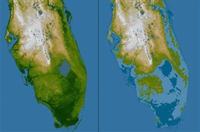
Most scientists believe that melt water from glaciers, the Greenland ice sheet, and possibly the West Antarctic ice sheet, along with thermal expansion from warming oceans, will raise sea levels by one-half to one meter (1.6 to 3.2 feet) over the next century and by one meter to two meters (6.5 feet) over the next 200 years; if sea level rises by a meter, “we will see higher tides, higher tidal velocities and tidal inundation every day,” says one expert; “And we’ll have a different shoreline”
-
-
China raises rare Earth elements production
China has about 30 percent of rare earths deposits but accounts for 97 percent of global production; the Ministry of Land and Resources said Thursday that this year’s production quota of rare earths will be 93,800 tons, an increase of about 5 percent over 2010
-
-
Jersey community college first to offer homeland security degree
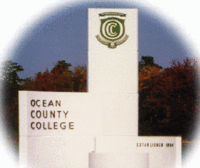
Ocean County College is the first community college in New Jersey to begin offering students an associate’s degree in homeland security studies; as police departments across the United States have seen their budgets slashed, it has become increasingly difficult for recent graduates hoping to find jobs as police officers; the program encourages students to pursue law enforcement opportunities with DHS; currently there is a need in the private and public sector for qualified personnel, but a shortage of talented individuals; the program will introduce homeland security to students and if they are interested in a position with the government must receive a bachelor’s degree from a four year college
-
-
Corruption in academic accreditation
Little-known colleges, most unaccredited, exploit Byzantine federal regulations, enrolling almost exclusively foreign students and charging them upward of $3,000 for a chance to work legally in the United States; they flourish in California and Virginia, where regulations are lax, and many of their practices are shoddy — for instance, holding some classes on only three weekends per semester; these colleges usher in thousands of foreign students and generate millions of dollars in profits because they have the power, bestowed by the U.S. government, to help students get visas
-
-
UN warns of potential food crisis
A UN Food and Agriculture Organization official warned that countries are not doing enough to increase food production to meet rising demand and that the world could be headed for a global food crisis; global food production must rise by 70 percent in order to meet the estimated demand for food; food prices have already soared in recent months and in 2010 food prices increased by 25 percent; rising prices sparked food riots in Egypt and Tunisia, which contributed to the overthrow of their governments; large disasters and droughts have significantly reduced crop yields across the world; as supply has fallen, demand has spiked due to population growth and increased use of food to manufacture biofuels
-
-
Lockheed developing autonomous and covert rover
A surveillance robot aims to operate around humans without being detected by them; the machine uses a laser scanner to builds a 3D computer model of its surroundings and uses a set of acoustic sensors to distinguish the proximity and direction of footsteps
-
-
After EPA fine, mining company building $200 million water treatment plant

America’s largest underground coal mining company, Consol Energy, is constructing a $200 million water treatment plant in West Virginia, after being fined $5.5 million by the Environmental Protection Agency (EPA); in 2009 discharge from Consol’s mining operation caused a toxic golden algae bloom that killed aquatic life along thirty miles of Dunkard Creek; the advanced waste water treatment plant will be the largest facility in Appalachia; the plant will be capable of treating 3,500 gallons of water per minute and will remove more than forty-three tons of dissolved solids, including eleven million pounds of chloride
-
-
Drought-prone pasts may foretell New York's and Atlanta's futures

By fall 2007, during the second year of a three-year drought, Atlanta had roughly three months’ supply of water remaining while Athens, Georgia was down to approximately fifty days; another drought dramatically lowered New York City reservoirs to 33 percent of capacity in 1981; droughts in those cities and their surrounding regions were typically longer and more frequent centuries ago than they were for most of the twentieth century; a return to historic climate patterns would bring more frequent and prolonged droughts
-
-
First response, law enforcement ground robot market to grow
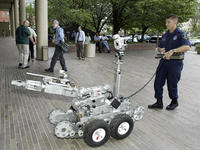
The current market for first responder and law enforcement ground robots is estimated at $203 million; just-published research says that the market is poised for a significant growth; first responder robots cost about $50,000 and up, which is the cost of a person for one year; the challenge for vendors is thus to find applications where the robot is used 24x7 365 days per year
-
-
Oil industry creates center for off-shore safety
Following several accidents on off-shore oil rigs, the U.S. oil and gas industry will launch a center dedicated to investigating safety issues related to off-shore drilling; the center will be operated by the American Petroleum Institute (API) but will be walled off from the trade group’s lobbying work
-
-
Innovative decontamination cloth reaches market
A new decontamination cloth, developed for use by soldiers and first responders, is now available in several forms — as preshaped mitts for personal wipedowns if someone is exposed to toxins or chemicals, individual wipe cloths and pads, and in rolls perforated to produces 12-inch by 12-inch sheets, like paper towels in a kitchen
-
-
Past "hyperthermals" offer clues about anticipated climate changes
Bursts of intense global warming that have lasted tens of thousands of years have taken place more frequently throughout history than previously believed; most of the events raised average global temperatures between 2° and 3° Celsius (3.6 and 5.4° F), an amount comparable to current conservative estimates of how much temperatures are expected to rise in coming decades as a consequence of anthropogenic global warming; most hyperthermals lasted about 40,000 years before temperatures returned to normal
-
-
Napolitano enlists MIT engineers and scientists
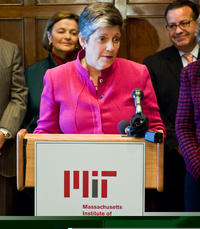
At a recent speech at the Massachusetts Institute of Technology (MIT), Homeland Security Secretary Janet Napolitano urged for greater private sector involvement to help develop technological solutions to secure critical infrastructure and the border; Napolitano said that technology will be the key to DHS’ future in screening passengers and cargo more effectively and efficiently; she also called for more people with cybersecurity, engineering, and science skills to assist the government; in particular, she pointed to the “data problem,” with the massive amounts of data that government agencies must sift through to detect terrorist threats, the sheer volume alone presents a logistical challenge to counter-terrorism efforts
-
-
Sensors detecting nuclear tests detect tsunamis, too
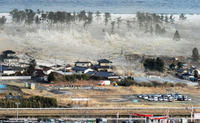
The Comprehensive Nuclear test-Ban Treaty (CTBT) is supported by arrays of sensors at sixty sites across the world that listen for the low boom of atmospheric blasts. They are tuned to infrasound — frequencies under 20 hertz (cycles per second), the lowest humans can hear; these sensors are meant to pick up illicit nuclear tests, but they can also pick up tsunami-producing tremors — and provide timely warning to those likely to be affected
-
-
NOAA scientists cleared of wrongdoing in email scandal
A recent investigation by the Commerce Department’s Inspector General has cleared the National Oceanic and Atmospheric Administration (NOAA) of any wrong doing in a recent scandal over an email exchange with British academics; in 2009 more than 1,000 emails between NOAA scientists and the Climatic Research Unit at the University of East Anglia in the United Kingdom were stolen; the emails suggested that scientists had manipulated results and thrown out faulty data; the recent report exonerates the scientists of any wrongdoing, and several British reviews have already cleared the name of British scientists
-
More headlines
The long view
Autonomous Vehicle Technology Vulnerable to Road Object Spoofing and Vanishing Attacks
Researchers have demonstrated the potentially hazardous vulnerabilities associated with the technology called LiDAR, or Light Detection and Ranging, many autonomous vehicles use to navigate streets, roads and highways. The researchers have shown how to use lasers to fool LiDAR into “seeing” objects that are not present and missing those that are – deficiencies that can cause unwarranted and unsafe braking or collisions.
Tantalizing Method to Study Cyberdeterrence
Tantalus is unlike most war games because it is experimental instead of experiential — the immersive game differs by overlapping scientific rigor and quantitative assessment methods with the experimental sciences, and experimental war gaming provides insightful data for real-world cyberattacks.
Prototype Self-Service Screening System Unveiled
TSA and DHS S&T unveiled a prototype checkpoint technology, the self-service screening system, at Harry Reid International Airport (LAS) in Las Vegas, NV. The aim is to provide a near self-sufficient passenger screening process while enabling passengers to directly receive on-person alarm information and allow for the passenger self-resolution of those alarms.
Falling Space Debris: How High Is the Risk I'll Get Hit?
An International Space Station battery fell back to Earth and, luckily, splashed down harmlessly in the Atlantic. Should we have worried? Space debris reenters our atmosphere every week.
Testing Cutting-Edge Counter-Drone Technology
Drones have many positive applications, bad actors can use them for nefarious purposes. Two recent field demonstrations brought government, academia, and industry together to evaluate innovative counter-unmanned aircraft systems.
Strengthening the Grid’s ‘Backbone’ with Hydropower
Argonne-led studies investigate how hydropower could help add more clean energy to the grid, how it generates value as grids add more renewable energy, and how liner technology can improve hydropower efficiency.
